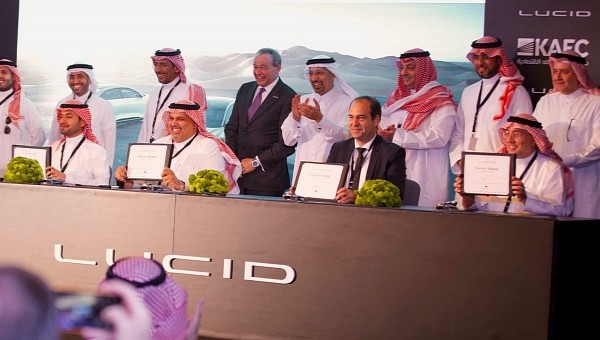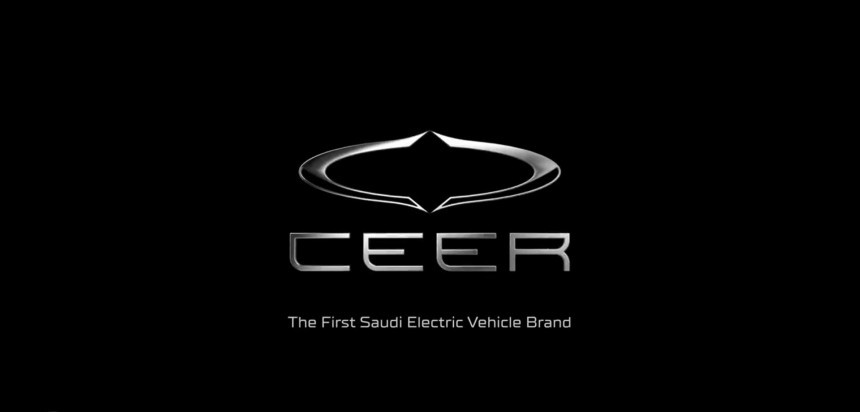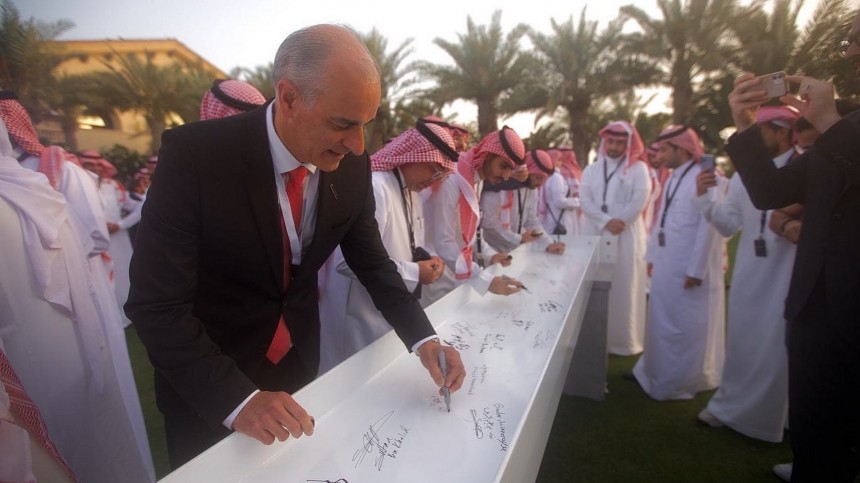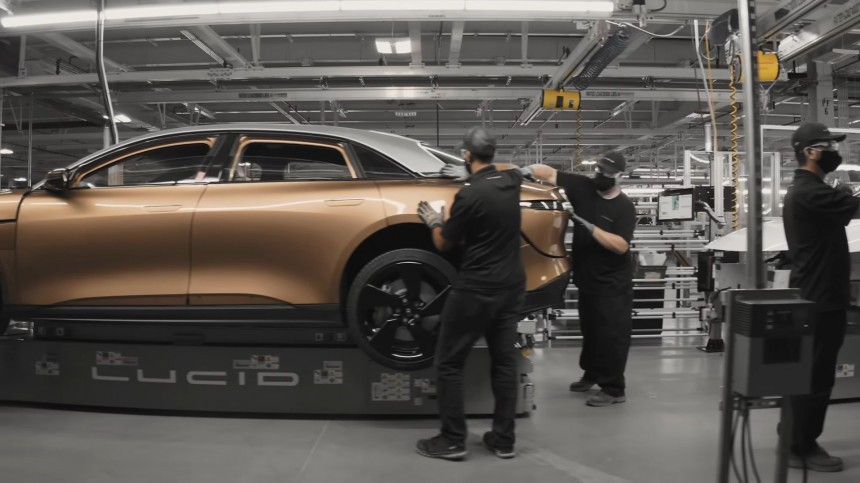Saudi Arabia’s homegrown all-electric car brand Ceer says the country is gunning for a yearly production of 500,000 EVs by 2030. This signals a major policy shift for the world’s biggest crude oil exporter. Here’s how it may involve Lucid, Hyundai, BMW, and iPhone manufacturer Foxconn.
A little over two weeks ago, Ceer released a short clip depicting a nostalgic look at early American automotive innovations, the progress made over the years in this sector, and mobile technologies like the iPhone. But it did not last long. The story immediately shifted to how Saudi Arabia is going to heavily invest in designing and manufacturing all-electric vehicles. Currently, EVs are considered to be the future of virtually everything related to land transportation. The Saudi’s efforts would rival what China, the U.S., and Europe are doing.
But first, a little background is necessary.
The United States of America is the world’s biggest producer of oil, but it’s also the largest consumer of what has been commonly known as “black gold.” It’s also the place where one of the world’s most successful EV makers was established – Tesla. The U.S. played a key role in helping Saudi Arabia to establish its great oil industry, an aspect reflected by the name “Arabian American Oil Co.” once held by the company that managed the entire operation.
Today, that same company is known as the Saudi Arabian Oil Company (Saudi Aramco) and is one of the world’s most profitable brands, if not the number one most profitable corporation in this sector. But besides creating tons of revenue, the government-owned oil company is also being blamed for having an incredibly large carbon footprint because of fossil fuel extraction and refining. And looking at how the auto industry is slowly but surely heading toward a zero-tailpipe emission future, the Saudis do not want to miss this ride.
Saudi Arabia and the U.S. remained close allies, even though friction between them appeared from time to time. For example, when American companies used to own more than half of Aramco, the U.S. authorities managed to convince stakeholders that it would be better for the headquarters to be moved from New York to Dhahran, Saudi Arabia.
Last year, we told you about Ceer’s launch and how it plans on tapping Foxconn for manufacturing efforts and BMW for components.
“Ceer will create thousands of skilled jobs in the Kingdom by empowering the Saudi youth,” recently said the entity on its official 11-year-old Twitter account, without sharing any specifics. And, from time to time, various other encouraging posts appear on social media depicting the use of virtual reality (VR), holograms, and advanced robotics. However, it’s not entirely clear where these things are happening and if they are more than just renders.
A relatively new press release doubles down on the promise of turning Saudi Arabia into a major EV hub. Ceer says that the same Public Investment Fund (PIF) that owns it will keep the automotive sector as one of its highest priorities. Besides that, it confirms that Hyundai signed a memorandum of understanding (a non-binding document) which sets the stage for a possible plant in the Kingdom.
The same Ceer press release says that most vehicles in Saudi Arabia today are imported, but that’s poised for change. The Kingdom plans to make its cars, establish a new supply chain, and turn the Middle Eastern country into a hub where big automakers are conducting operations. They also want to enhance the non-oil GDP growth, a sign that fossil fuel production is predicted to turn into a thing of the past. But Ceer underlines the shift to EVs is also important for lowering carbon emissions by 2060, according to a national strategy known as the Saudi Green Initiative.
As has been the case with Formula 1 and other similar intense competitions over the years, the motorsport field is a great environment for testing technologies that may one day make their way onto production vehicles. For EVs, weight is of paramount importance. The battery packs in use today are heavy. Add all the safety elements that need to be present in every car, and things start to look gloomy.
To guarantee great range and efficiency, automakers must cut weight from somewhere else. Or they just go with the flow and accept that battery-electric cars will be a lot heavier than their internal combustion engine counterparts, which is exactly what has been happening lately. For example, a BMW X3 has a curb weight of 4,149 lb (1,882 kg), while the all-electric and rear-wheel-drive iX3 is 668 lb (303 kg) heavier. Lucid’s drive unit puts out 469 hp (476 ps) and encompasses the motor, the inverter, the differential, and the transmission, all while weighing less than a steel wheel.
Also, another little fun fact is that Rawlinson used to be Tesla's Vice-President of Vehicle Engineering and he was in charge of turning the Model S from a dream into reality. He left Tesla in 2012 citing the need to take care of his mother and joined Lucid in 2013. Elon Musk tried to minimize Rawlinson's role and even said that he wasn't involved in managing engineering decisions. Lucid was founded in 2007 and went by the name of Atieva. It did not originally want to manufacture all-electric cars, but only parts for them.
So, this American EV maker is poised to do great things for battery-electric cars. And that might be what piqued the interest of Saudi Arabia. Even though they own the majority of Lucid through the PIF, a rumor has been circulating since the beginning of 2023 that the Saudis might want to take the company private and change its name to Ceer. At the time of writing, this was not confirmed by any reliable source. Still, the stock price went from around six dollars a share to almost 13 dollars in under a month. Trading has also been halted nine times because of the increased interest in the brand.
However, it would make sense for Saudi Arabia’s EV ambitions to buy Lucid and use it for its aspiring car industry, especially as Foxconn joined in on the effort. Attracting the likes of Hyundai or BMW is another great idea for turning the Middle Eastern country into an attractive place for other big automakers.
Besides that, Lucid has already confirmed last year that it will build a plant in Saudi Arabia.
“By 2030, expect that this latest addition to the country’s industrial capabilities will add tens of thousands of high-tech jobs, attract significant foreign direct investment, and transform the country into an automotive exporter,” says Ceer.
But until Saudi Arabia shows at least a concept vehicle sporting the new company’s logo, chances are these EV manufacturing ambitions will remain only a dream. Or, who knows, they might be postponed intentionally until the world starts to seriously move away from gas, diesel, and other petroleum derivatives.
But first, a little background is necessary.
The United States of America is the world’s biggest producer of oil, but it’s also the largest consumer of what has been commonly known as “black gold.” It’s also the place where one of the world’s most successful EV makers was established – Tesla. The U.S. played a key role in helping Saudi Arabia to establish its great oil industry, an aspect reflected by the name “Arabian American Oil Co.” once held by the company that managed the entire operation.
Today, that same company is known as the Saudi Arabian Oil Company (Saudi Aramco) and is one of the world’s most profitable brands, if not the number one most profitable corporation in this sector. But besides creating tons of revenue, the government-owned oil company is also being blamed for having an incredibly large carbon footprint because of fossil fuel extraction and refining. And looking at how the auto industry is slowly but surely heading toward a zero-tailpipe emission future, the Saudis do not want to miss this ride.
Enter Ceer
Today, this relationship continues to evolve in the private sector, where the Middle Eastern country invests heavily in companies like Twitter or Lucid. But history tends to repeat itself, so Saudi Arabia doesn’t want to just earn money from its investments. It also desires more domestic industry growth. In order to not miss out on what EVs will mean to the world after 2030, Ceer was established. This aspiring brand promises to deliver all-electric vehicles designed, manufactured, and assembled in its home country.Last year, we told you about Ceer’s launch and how it plans on tapping Foxconn for manufacturing efforts and BMW for components.
“Ceer will create thousands of skilled jobs in the Kingdom by empowering the Saudi youth,” recently said the entity on its official 11-year-old Twitter account, without sharing any specifics. And, from time to time, various other encouraging posts appear on social media depicting the use of virtual reality (VR), holograms, and advanced robotics. However, it’s not entirely clear where these things are happening and if they are more than just renders.
A relatively new press release doubles down on the promise of turning Saudi Arabia into a major EV hub. Ceer says that the same Public Investment Fund (PIF) that owns it will keep the automotive sector as one of its highest priorities. Besides that, it confirms that Hyundai signed a memorandum of understanding (a non-binding document) which sets the stage for a possible plant in the Kingdom.
What about Lucid?
Today, the same PIF that owns Ceer also has a majority stake (65%) in Lucid. Even though the American automaker is not as profitable as Tesla or as well-known as Rivian and does not plan on producing a high-volume low-cost all-electric car soon, it’s being regarded as one of the best innovators in the EV space. Most recently, Lucid CEO and CTO Peter Rawlinson introduced an in-house built motorsports electric drive unit that has a power density of 14.7 hp per kg, is capable of incredible energy recuperation, and weighs only 70.5 lb (32 kg).As has been the case with Formula 1 and other similar intense competitions over the years, the motorsport field is a great environment for testing technologies that may one day make their way onto production vehicles. For EVs, weight is of paramount importance. The battery packs in use today are heavy. Add all the safety elements that need to be present in every car, and things start to look gloomy.
To guarantee great range and efficiency, automakers must cut weight from somewhere else. Or they just go with the flow and accept that battery-electric cars will be a lot heavier than their internal combustion engine counterparts, which is exactly what has been happening lately. For example, a BMW X3 has a curb weight of 4,149 lb (1,882 kg), while the all-electric and rear-wheel-drive iX3 is 668 lb (303 kg) heavier. Lucid’s drive unit puts out 469 hp (476 ps) and encompasses the motor, the inverter, the differential, and the transmission, all while weighing less than a steel wheel.
Also, another little fun fact is that Rawlinson used to be Tesla's Vice-President of Vehicle Engineering and he was in charge of turning the Model S from a dream into reality. He left Tesla in 2012 citing the need to take care of his mother and joined Lucid in 2013. Elon Musk tried to minimize Rawlinson's role and even said that he wasn't involved in managing engineering decisions. Lucid was founded in 2007 and went by the name of Atieva. It did not originally want to manufacture all-electric cars, but only parts for them.
However, it would make sense for Saudi Arabia’s EV ambitions to buy Lucid and use it for its aspiring car industry, especially as Foxconn joined in on the effort. Attracting the likes of Hyundai or BMW is another great idea for turning the Middle Eastern country into an attractive place for other big automakers.
Besides that, Lucid has already confirmed last year that it will build a plant in Saudi Arabia.
“By 2030, expect that this latest addition to the country’s industrial capabilities will add tens of thousands of high-tech jobs, attract significant foreign direct investment, and transform the country into an automotive exporter,” says Ceer.
But until Saudi Arabia shows at least a concept vehicle sporting the new company’s logo, chances are these EV manufacturing ambitions will remain only a dream. Or, who knows, they might be postponed intentionally until the world starts to seriously move away from gas, diesel, and other petroleum derivatives.




















































